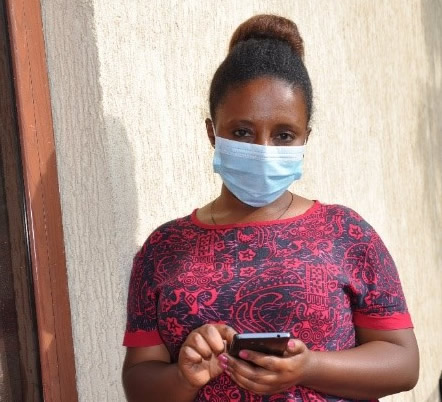Equipping frontline health workers with the required knowledge and skills to respond to COVID-19 at the community level is one of the priorities of Ethiopia’s Ministry of Health.
Degsew Mezgebu, 30, is a clinical nurse, working in Bahirdar town of Amhara Regional State. She is among the tens of thousands of health workers who stand firmly in the fight against the pandemic. She was among the first cohort of health workers to take the mobile phone-based training rolled out by the Ministry of Health in collaboration with Amref Health Africa in Ethiopia.
She completed the training ahead of others in an effort to prepare herself to quickly reach out to her community. Degsew explained, “how I got involved in the training was easy. I was asked to share my mobile number and included it in the trainees list. Then, I was oriented to call a code number to access to the virtual training. It took me just one hour and thirty minutes, such a quick training with loads of knowledge and skill that help me respond to the pandemic,” she said.
The training makes her daily endeavor in the fight against COVID-19 easy. Before the training she had little knowledge about how to respond to the pandemic. “As soon as I completed the training, I embarked for the battle against the pandemic that is silently spreading. The knowledge I gained from the training gave me the confidence I really needed,” she said.
Degsew believes the training is an important intervention for all health workers to respond quickly to the outbreak. “I have never been trained virtually by mobile technology before, and I hardly expected it would be viable. The training has provided us with very well-tailored information about what COVID-19 is, how we can help communities in their efforts to prevent and control the spread of the virus. It has all the required tips of what we, as frontline health workers, should be aware of and recall when reaching out to our communities. The details included in the modules are all clear and easy to comprehend,” she said.
Spotting vulnerable segments of the community to whom the health workers should give priority in the prevention efforts is one of the key components of the training. This helps reach those who may not have the chance to hear about the pandemic, those who do not have access to any media, and those whose level of knowledge and access limit them from learning about the virus and preventive measures. Some may hear about the virus from daily TV or radio reporting, which may not be tailored and sufficient. “Identifying and helping vulnerable sections of our communities is key to reduce the risk of infection in the communities. The training provides us the knowledge and skills as to who we should prioritize and how to reach out to them,” she noted.
Degsew walks from house to house to educate communities. What worries her the most is that the virus is spreading widely while her community seems to fail to practice the preventive measures. “Compared to the time when the first cases announced, now we can see, many appear to be reluctant to perform basic prevention measures and take the needed precaution. They do not feel the need to wear a mask and keep their distance. So, all the health workers, in particular, need to be committed to raising awareness and fighting against the virus until we make sure it is no longer a public health concern, and we become champions of COVID-19 prevention for our community. The community should also support health workers in their efforts by helping them spread the message of prevention.”
Amref Health Africa teams up with African communities to create lasting health change.

